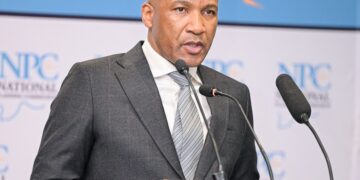- Tsaone Segaetsho
Minister of Transport and Infrastructure, Noah Salakae, this week announced a sweeping reduction of infrastructure projects initiated under the Development Manager (DM) model, with 90% of the initiatives conceived in 2023 now shelved in the name of “effectiveness and cost efficiency” in national project management, especially in the construction sector.
Salakae had already suspended half of the projects in December 2024 to curb wastage in an economy strained by dwindling diamond revenues. The latest move further cuts back the programme, which has been intensely scrutinised for its spiralling costs and questionable governance.
The DM model, approved by the previous administration and allocated P13 billion, was intended as an integrated construction, procurement and engineering framework to deliver key infrastructure, roads, schools, hospitals, and government housing, on time and within budget. However, President Duma Boko’s government, upon taking office in November 2024, identified the scheme as a potential source of inflated costs. Boko immediately appointed a national task force to investigate the model, signalling concerns in his State of the Nation Address.
By December 2024, the Minister had halted 70 of the 148 projects managed by nine contracted DMs, leaving 78 to proceed due to “possible far-reaching legal and financial implications associated with destabilisation.”
The task force’s report, released last week and seen by this publication, revealed that the original P13 billion budget had ballooned to P56 billion. It recommended terminating all projects except those bound by inescapable legal obligations.
Salakae confirmed that his ministry had conducted a broader review of the DM model, incorporating additional stakeholder concerns, and assessing its conceptualisation and approval, the procurement of Development Managers, the implementation and coordination of DM projects, and the current status of the model.
“Mr Speaker, while the DM model was introduced with well-intentioned objectives, the review has revealed several critical shortcomings,” Salakae said.
“These include procedural deficiencies, insufficient stakeholder engagement, and a lack of alignment with legal and regulatory frameworks. Furthermore, the financial implications—particularly the structure and magnitude of associated fees—have placed an unsustainable burden on Government resources.”
The review also found that several project budgets excluded full construction cost estimates, covering only design and consultancy fees, despite the DM model’s mandate to manage projects from conceptualisation to completion. The DM fee structure, capped at 14% regardless of project scale or complexity, was cited as a major cost driver.
“This is a deviation from industry practice, where professional fees are calculated on a sliding scale, decreasing in percentage as construction costs increase,” Salakae noted.
Just under two years after contracts were signed with the nine DMs, shifting economic conditions and declining revenues have made the execution of all 148 planned projects untenable.
In a decisive policy shift, Salakae announced that the government will revoke all three Presidential Directives authorising the DM model and its governance structures. Sixteen projects currently under construction will continue under alternative delivery or financing methods, while the 132 projects still at conceptualisation stage will undergo a full reassessment to identify options more closely aligned with government priorities.










